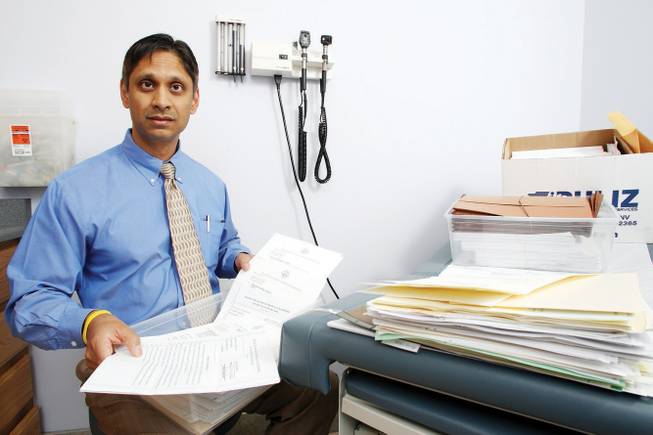
Dr. Navneet Sharda displays paperwork and legal documents in March 2009. He won a $60,000 verdict against a fellow doctor Sharda says defamed him by criticizing his character and medical expertise.
Monday, Aug. 31, 2009 | 2 a.m.
Sun Archives
- Doctors' bitter fight heading for court (4-1-2009)
Sun Coverage
Beyond the Sun
Five years ago, Dr. Navneet Sharda sued a fellow cancer specialist, saying the other doctor had defamed him by criticizing his character and medical expertise.
A jury this month agreed with Sharda. But it’s hard for him to celebrate the victory.
He’s not sure his practice will survive.
Sharda says he’s spent about $300,000 in court costs to squelch rumors that he claims were started by oncologist Dr. Dhan Kaushal. He says Kaushal’s defamation went on so long and was so widespread in the local medical community that it ruined his radiation oncology practice, which is dependent on referrals from other physicians.
On August 17, a Clark County District Court jury sided unanimously with Sharda in the defamation case, awarding him $60,000 in damages.
Kaushal declined to comment for this story.
Sharda said the money is nothing compared to the millions of dollars he’s lost in referrals, causing him to face possible bankruptcy. The defamation case, he says, shows how difficult it is for younger doctors to become established in Las Vegas because of the competitive nature of the medical community.
Sharda hopes the victory will restore trust in his expertise.
“Winning the case is nothing,” Sharda said. “Winning the hearts and minds of the doctors and patients in Las Vegas is everything.”
Both physicians are Indian, and they run in the same social circles with Indian primary care doctors who may naturally refer them patients. Sharda specializes in radiation treatments, and Kaushal in chemotherapy.
When Sharda started his solo practice, the two doctors referred patients who needed both forms of therapy to each other.
Sharda says the relationship soured when primary care doctors started sending patients for initial consultations to him instead of Kaushal. The tension erupted when they disagreed about treatment methods for patients, he said.
Sharda said one dispute led to an angry phone call from Kaushal, who said: “I’m going to teach you a lesson and drive you out of town.”
Sharda started his solo practice in 2001 and says things were going well until 2003, which is when he believes Kaushal began bad-mouthing him to other doctors. A 2004 letter written by Kaushal was obtained in the case and says that Sharda “has uncontrollable and nonstop ways of doing unethical, unwanted, unheard, nonconventional and unacceptable ways of doing radiation therapy.”
The letter accuses Sharda of “going out of his way to give radiation therapy when it’s not necessary and/or without looking at the needs of the patient.” Kaushal also writes that he has tried to prevent Sharda from getting privileges at a hospital and that Sharda has an “unfavorable history with many of the radiation and medical oncologists.”
In an Aug. 25, 2004 letter — Sharda said it was sent to the medical executive committee at Sunrise Hospital & Medical Center — Kaushal wrote that Sharda was not allowed to attend meetings at O’Callaghan Federal Hospital at Nellis Air Force Base “through my effort as I am quite aware about his unethical ways of practicing medicine.”
The Sunrise letter included patient records that Kaushal said demonstrated Sharda’s malpractice. Sharda said no one at Sunrise pursued the complaint.
During the trial, Dr. Seth Adjovu, an internist, testified that Kaushal told him in 2004 that Sharda overtreats patients and gives them too much radiation and that working with him would likely result in trouble.
“He basically tried to tell me not to refer patients to him,” Adjovu testified. “In effect, he was telling me that I was likely to get sued with Dr. Sharda if I continued to refer to him because of the way he practices and the high likelihood of malpractice.”
Sharda also accuses Kaushal of filing bogus complaints against him with the Nevada State Medical Examiners Board, insurance companies and local hospitals that say he commits malpractice and bills patients for unnecessary procedures. He still faces a complaint with the medical board.
Dr. William Noyes testified on Sharda’s behalf in the defamation case, saying he reviewed the patient records in the cases that were sent to the medical board and determined that the treatment was “medically appropriate, and actually had a response that was well above any average.”
Noyes, whom Sharda had testify on his behalf because he reviews cases to determine appropriateness of care on behalf of the Centers for Medicare & Medicaid Services, concluded that the care provided by Sharda was “excellent,” according to his deposition in the case.

Join the Discussion:
Check this out for a full explanation of our conversion to the LiveFyre commenting system and instructions on how to sign up for an account.
Full comments policy